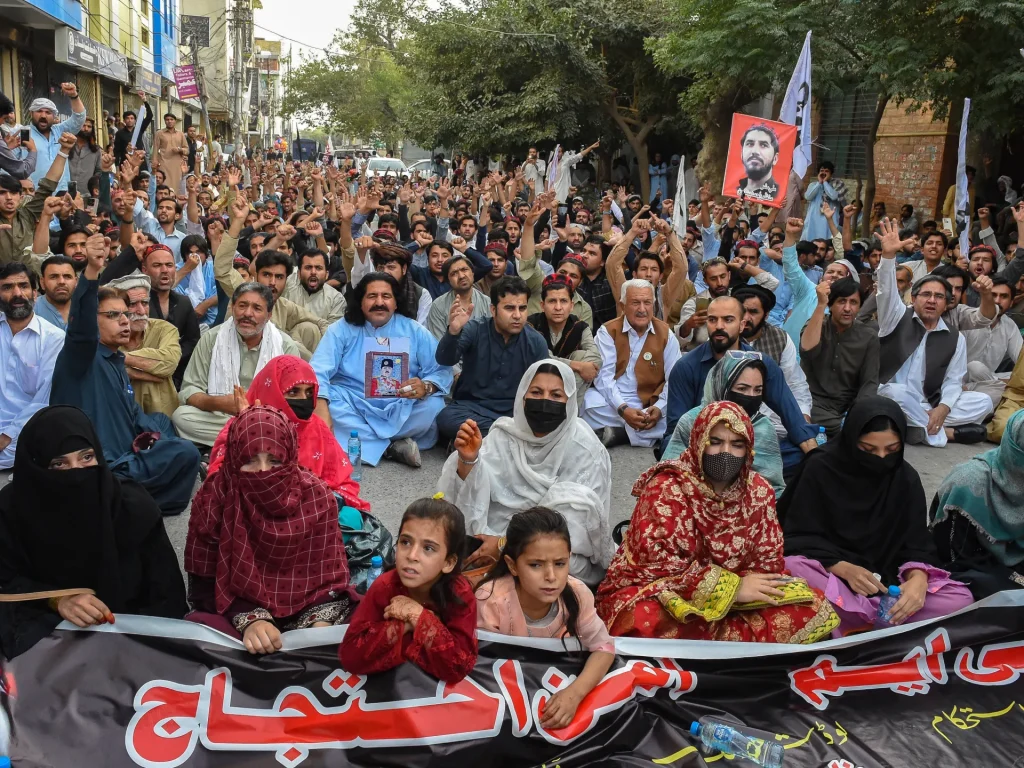Amnesty International has called for the immediate revocation of the Pakistan government’s ban on the Pashtun Tahaffuz Movement (PTM). The use of anti-terrorism laws to target activists and peaceful protesters, particularly from minority groups, undermines the fundamental rights to freedom of association and peaceful assembly.
The PTM is a grassroots movement advocating for the human rights of Pashtuns, who have long faced harassment and violence from Pakistani authorities. On 6 October 2024, the PTM was officially designated as a “proscribed organization” under the First Schedule of the Anti-Terrorism Act (1997), further intensifying the government’s crackdown.
“The timing of the PTM’s designation as a proscribed organization, just days before their planned gathering on 11 October, highlights the ongoing systematic efforts by Pakistani authorities to suppress dissent. This ban is part of a broader trend of using overreaching terrorism laws to silence peaceful movements, particularly those from marginalized communities,” stated Babu Ram Pant, Amnesty International’s Deputy Regional Director for South Asia. “The unlawful use of force, enforced disappearances, and media restrictions have been employed for years to stifle these movements.”
Criminalization of Dissent Under Anti-Terrorism Laws
Pakistan’s Anti-Terrorism Act gives the government sweeping powers to label organizations as “proscribed” based on unverified information. However, in the case of the PTM, the government has provided no concrete evidence to justify this designation. The law also allows the government to make such decisions without a fair hearing or representation from the affected organizations.
Zubair Shah Agha, a PTM Central Committee member, spoke to Amnesty International about the long-standing efforts to criminalize their peaceful movement through this anti-terror legislation. He noted that PTM members, as well as Baloch activists from the Baloch Yakjehti Committee (BYC), have been falsely portrayed as militants, leading to their inclusion on the ATA’s list of “proscribed persons.”
Unlawful Force, Arbitrary Arrests, and Detentions
The recent ban coincides with the upcoming Pashtun Qaumi Jirga, scheduled for 11 October in the Khyber District. Authorities claim the gathering poses a threat to national peace and security. Zubair highlighted how similar tactics have been used in the past, with PTM members being targeted under the Maintenance of Public Order (MPO) Ordinance before and after peaceful assemblies.
On 1 and 2 October, a peaceful protest camp in Jamrud, Khyber District, was forcefully dispersed using teargas and firearms, resulting in the arrest of nearly 100 PTM activists. Many have been detained under the MPO, which allows for preventive detention for up to three years for speech that allegedly causes public alarm. Additionally, 16 students from the University of Malakand were arrested on 4 October while preparing to attend the PTM gathering. PTM leader Ali Wazir, who was granted bail in early August, remains in detention after being re-arrested outside the jail following a court ruling that deemed his detention illegal.
“The Pakistani government must reverse course immediately and end its criminalization of peaceful protests. The targeting of dissenting groups, especially based on ethnicity, must stop. The designation of PTM under the Anti-Terrorism Act should be revoked, and all arbitrarily detained PTM activists and supporters should be released,” Babu Ram Pant urged. He also called on authorities to respect the right to peaceful assembly and refrain from obstructing the Pashtun Qaumi Jirga.




